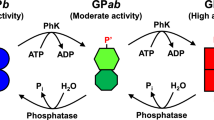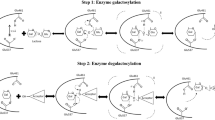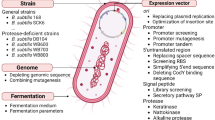Abstract
Scientists are interested in understanding the molecular origin of protein thermostability and thermoactivity for possible biotechnological applications. The enzymes from extremophilic organisms have been of particular interest in the last two decades. β-glycosidase, Tkβgly is a hyperthermophilic enzyme from Thermococcus kodakarensis KOD1. Tkβgly contains two conserved cysteine residues, C88 and C376. The protein tertiary structure obtained through homology modeling suggests that the C88 residue is located on the surface whereas C376 is inside the protein. To study the role of these cysteine residues, we substituted C88 and C376 with serine residues through site-directed mutagenesis. The wild-type and C376S protein existed in dimeric form and C88S in monomeric form, in an SDS-PAGE gel under non-reducing conditions. Optimal temperature experiments revealed that the wild-type was active at 100 °C whereas the C88S mutant exhibited optimal activity at 70 °C. The half-life of the enzyme at 70 °C was drastically reduced from 266 h to less than 1 h. Although C88 was not present in the active site region, the k cat/K m of C88S was reduced by 2-fold. Based on the structural model and biochemical properties, we propose that C88 is crucial in maintaining the thermostability and thermoactivity of the Tkβgly enzyme.




Similar content being viewed by others
References
Aguilar CF, Sanderson I, Moracci M, Ciaramella M, Nucci R, Rossi M, Pearl LH (1997) Crystal structure of the beta-glycosidase from the hyperthermophilic archeon Sulfolobus solfataricus: resilience as a key factor in thermostability. J Mol Biol 271(5):789–802. doi:10.1006/jmbi.1997.1215
Ahmad N, Rashid N, Haider MS, Akram M, Akhtar M (2013) A novel maltotriose hydrolyzing thermo-acidophilic pullulan hydrolase type III from Thermococcus kodakarensis. Appl Environ Microbiol. doi:10.1128/AEM.03139-13
Alberty RA, Bock RM (1953) Alteration of the kinetic properties of an enzyme by the binding of buffer, inhibitor, or substrate. Proc Natl Acad Sci U S A 39(9):895–900
Atomi H, Fukui T, Kanai T, Morikawa M, Imanaka T (2004) Description of Thermococcus kodakaraensis sp. nov., a well studied hyperthermophilic archaeon previously reported as Pyrococcus sp. KOD1. Archaea 1(4):263–267. doi:10.1155/2004/204953
Atomi H, Sato T, Kanai T (2011) Application of hyperthermophiles and their enzymes. Curr Opin Biotechnol 22(5):618–626. doi:10.1016/j.copbio.2011.06.010
Bhatia Y, Mishra S, Bisaria VS (2002) Microbial beta-glucosidases: cloning, properties, and applications. Crit Rev Biotechnol 22(4):375–407. doi:10.1080/07388550290789568
Bradford MM (1976) A rapid and sensitive method for the quantitation of microgram quantities of protein utilizing the principle of protein-dye binding. Anal Biochem 72:248–254. doi:10.1016/0003-2697(76)90527-3
Cantarel BL, Coutinho PM, Rancurel C, Bernard T, Lombard V, Henrissat B (2009) The Carbohydrate-Active EnZymes database (CAZy): an expert resource for Glycogenomics. Nucleic Acids Res 37:D233–D238. doi:10.1093/nar/gkn663
D’Amico S, Marx J-C, Gerday C, Feller G (2003) Activity–stability relationships in extremophilic enzymes. J Biol Chem 278(10):7891–7896. doi:10.1074/jbc.M212508200
de Miguel Bouzas T, Barros-Velazquez J, Villa TG (2006) Industrial applications of hyperthermophilic enzymes: a review. Protein Pept Lett 13(7):645–651. doi:10.2174/092986606777790548
Egorova K, Antranikian G (2005) Industrial relevance of thermophilic Archaea. Curr Opin Microbiol 8(6):649–655. doi:10.1016/j.mib.2005.10.015
Elcock AH (1998) The stability of salt bridges at high temperatures: Implications for hyperthermophilic proteins. J Mol Biol 284(2):489–502. doi:10.1006/jmbi.1998.2159
Ertan H, Siddiqui KS, Muenchhoff J, Charlton T, Cavicchioli R (2012) Kinetic and thermodynamic characterization of the functional properties of a hybrid versatile peroxidase using isothermal titration calorimetry: insight into manganese peroxidase activation and lignin peroxidase inhibition. Biochimie 94(5):1221–1231. doi:10.1016/j.biochi.2012.02.012
Ezaki S, Miyaoku K, Nishi K, Tanaka T, Fujiwara S, Takagi M, Atomi H, Imanaka T (1999) Gene analysis and enzymatic properties of thermostable beta-glycosidase from Pyrococcus kodakaraensis KOD1. J Biosci Bioeng 88(2):130–135. doi:10.1016/S1389-1723(99)80190-X
Feese MD, Kato Y, Tamada T, Kato M, Komeda T, Miura Y, Hirose M, Hondo K, Kobayashi K, Kuroki R (2000) Crystal structure of glycosyltrehalose trehalohydrolase from the hyperthermophilic archaeum Sulfolobus solfataricus. J Mol Biol 301(2):451–464. doi:10.1006/jmbi.2000.3977
Gentile F, Amodeo P, Febbraio F, Picaro F, Motta A, Formisano S, Nucci R (2002) SDS-resistant active and thermostable dimers are obtained from the dissociation of homotetrameric beta-glycosidase from hyperthermophilic Sulfolobus solfataricus in SDS — stabilizing role of the A–C intermonomeric interface. J Biol Chem 277(46):44050–44060. doi:10.1074/jbc.M206761200
Han T, Zeng F, Li Z, Liu L, Wei M, Guan Q, Liang X, Peng Z, Liu M, Qin J, Zhang S, Jia B (2013) Biochemical characterization of a recombinant pullulanase from Thermococcus kodakarensis KOD1. Lett Appl Microbiol 57(4):336–343. doi:10.1111/lam.12118
Henrissat B, Callebaut I, Fabrega S, Lehn P, Mornon JP, Davies G (1995) Conserved catalytic machinery and the prediction of a common fold for several families of glycosyl hydrolases. Proc Natl Acad Sci U S A 92(15):7090–7094
Hogg PJ (2003) Disulfide bonds as switches for protein function. Trends Biochem Sci 28(4):210–214. doi:10.1016/S0968-0004(03)00057-4
Horikoshi K, Antranikian G, Bull AT, Robb FT, Stetter KO (2011) Extremophiles handbook. Springer, Tokyo
Jia B, Lee S, Pham BP, Kwack JM, Jin H, Li J, Wang Y, Cheong GW (2011) Biochemical characterization of deblocking aminopeptidases from the hyperthermophilic archaeon Thermococcus kodakarensis KOD1. Biosci Biotechnol Biochem 75(6):1160–1166. doi:10.1271/bbb.110114
Jorda J, Yeates TO (2011) Widespread disulfide bonding in proteins from thermophilic archaea. Archaea 2011:409156. doi:10.1155/2011/409156
Kado Y, Inoue T, Ishikawa K (2011) Structure of hyperthermophilic beta-glucosidase from Pyrococcus furiosus. Acta Crystallogr Sect F: Struct Biol Cryst Commun 67(12):1473–1479. doi:10.1107/S1744309111035238
Kim HW, Ishikawa K (2013) The role of disulfide bond in hyperthermophilic endocellulase. Extremophiles 17(4):593–599. doi:10.1007/s00792-013-0542-8
Kozakov D, Hall DR, Beglov D, Brenke R, Comeau SR, Shen Y, Li K, Zheng J, Vakili P, Paschalidis I, Vajda S (2010) Achieving reliability and high accuracy in automated protein docking: ClusPro, PIPER, SDU, and stability analysis in CAPRI rounds 13-19. Proteins 78(15):3124–3130. doi:10.1002/prot.22835
Laemmli UK (1970) Cleavage of structural proteins during the assembly of the head of bacteriophage T4. Nature 227(5259):680–685. doi:10.1038/227680a0
Liu DY, Zhang RF, Yang XM, Zhang ZH, Song S, Miao YZ, Shen QR (2012) Characterization of a thermostable beta-glucosidase from Aspergillus fumigatus Z5, and its functional expression in Pichia pastoris X33. Microb Cell Fact 11:25. doi:10.1186/1475-2859-11-25
Lucena SA, Moraes CS, Costa SG, de Souza W, Azambuja P, Garcia ES, Genta FA (2013) Miniaturization of hydrolase assays in thermocyclers. Anal Biochem 434(1):39–43. doi:10.1016/j.ab.2012.10.032
Mainer G, Sanchez L, Ena JM, Calvo M (1997) Kinetic and thermodynamic parameters for heat denaturation of bovine milk IgG, IgA and IgM. J Food Sci 62(5):1034–1038. doi:10.1111/j.1365-2621.1997.tb15032.x
Mallick P, Boutz DR, Eisenberg D, Yeates TO (2002) Genomic evidence that the intracellular proteins of archaeal microbes contain disulfide bonds. Proc Natl Acad Sci U S A 99(15):9679–9684. doi:10.1073/pnas.142310499
Mansfeld J, Ulbrich-Hofmann R (2007) The stability of engineered thermostable neutral proteases from Bacillus stearothermophilus in organic solvents and detergents. Biotechnol Bioeng 97(4):672–679. doi:10.1002/bit.21292
Matsumura M, Signor G, Matthews BW (1989) Substantial increase of protein stability by multiple disulphide bonds. Nature 342(6247):291–293. doi:10.1038/342291a0
Meng EC, Pettersen EF, Couch GS, Huang CC, Ferrin TE (2006) Tools for integrated sequence–structure analysis with UCSF Chimera. BMC Bioinforma 7:339. doi:10.1186/1471-2105-7-339
Mueller M, Kratzer R, Schiller M, Slavica A, Rechberger G, Kollroser M, Nidetzky B (2010) The role of Cys108 in Trigonopsis variabilis d-amino acid oxidase examined through chemical oxidation studies and point mutations C108S and C108D. BBA Proteins Proteom 1804(7):1483–1491. doi:10.1016/j.bbapap.2010.02.009
Pace NJ, Weerapana E (2013) Diverse functional roles of reactive cysteines. ACS Chem Biol 8(2):283–296. doi:10.1021/cb3005269
Pavelka A, Chovancova E, Damborsky J (2009) HotSpot Wizard: a web server for identification of hot spots in protein engineering. Nucleic Acids Res 37(suppl 2):W376–W383. doi:10.1093/nar/gkp410
Pradeep L, Udgaonkar JB (2002) Differential salt-induced stabilization of structure in the initial folding intermediate ensemble of Barstar. J Mol Biol 324(2):331–347. doi:10.1016/S0022-2836(02)01068-9
Rotrekl V, Nejedla E, Kucera I, Abdallah F, Palme K, Brzobohaty B (1999) The role of cysteine residues in structure and enzyme activity of a maize beta-glucosidase. Eur J Biochem/FEBS 266(3):1056–1065. doi:10.1046/j.1432-1327.1999.00948.x
Santangelo TJ, Cubonova L, Reeve JN (2010) Thermococcus kodakarensis genetics: TK1827-encoded beta-glycosidase, new positive-selection protocol, and targeted and repetitive deletion technology. Appl Environ Microb 76(4):1044–1052. doi:10.1128/AEM.02497-09
Schmidt B, Ho L, Hogg PJ (2006) Allosteric disulfide bonds. Biochemistry 45(24):7429–7433. doi:10.1021/bi0603064
Siadat O, Lougarre A, Lamouroux L, Ladurantie C, Fournier D (2006) The effect of engineered disulfide bonds on the stability of Drosophila melanogaster acetylcholinesterase. BMC Biochem 7(1):12. doi:10.1186/1471-2091-7-12
Sibanda BL, Thornton JM (1985) [beta]-Hairpin families in globular proteins. Nature 316(6024):170–174. doi:10.1038/316170a0
Siddiqui KS, Cavicchioli R, Thomas T (2002) Thermodynamic activation properties of elongation factor 2 (EF-2) proteins from psychrotolerant and thermophilic Archaea. Extremophiles 6(2):143–150. doi:10.1007/s007920100237
Siddiqui KS, Poljak A, Guilhaus M, Feller G, D’Amico S, Gerday C, Cavicchioli R (2005) Role of disulfide bridges in the activity and stability of a cold-active alpha-amylase. J Bacteriol 187(17):6206–6212. doi:10.1128/JB.187.17.6206-6212.2005
Sterner R, Liebl W (2001) Thermophilic adaptation of proteins. Crit Rev Biochem Mol 36(1):39–106. doi:10.1080/20014091074174
Tachibana Y, Leclere MM, Fujiwara S, Takagi M, Imanaka T (1996) Cloning and expression of the α-amylase gene from the hyperthermophilic archaeon Pyrococcus sp. KOD1, and characterization of the enzyme. J Ferment Bioeng 82(3):224–232. doi:10.1016/0922-338X(96)88812-X
Tejirian A, Xu F (2010) Inhibition of cellulase-catalyzed lignocellulosic hydrolysis by iron and oxidative metal ions and complexes. Appl Environ Microbiol 76(23):7673–7682. doi:10.1128/AEM.01376-10
Vieille C, Zeikus GJ (2001) Hyperthermophilic enzymes: sources, uses, and molecular mechanisms for thermostability. Microbiol Mol Biol Rev 65(1):1–43. doi:10.1128/MMBR.65.1.1-43.2001
Wu I, Heel T, Arnold FH (2013) Role of cysteine residues in thermal inactivation of fungal Cel6A cellobiohydrolases. BBA Proteins Proteom 1834(8):1539–1544. doi:10.1016/j.bbapap.2013.05.003
Yang Z, Lasker K, Schneidman-Duhovny D, Webb B, Huang CC, Pettersen EF, Goddard TD, Meng EC, Sali A, Ferrin TE (2012) UCSF Chimera, MODELLER, and IMP: an integrated modeling system. J Struct Biol 179(3):269–278. doi:10.1016/j.jsb.2011.09.006
Zhang L, Chou CP, Moo-Young M (2011) Disulfide bond formation and its impact on the biological activity and stability of recombinant therapeutic proteins produced by Escherichia coli expression system. Biotechnol Adv 29(6):923–929. doi:10.1016/j.biotechadv.2011.07.013
Acknowledgments
This study was supported by the grants from National Taipei University of Technology (NTUT-98-140-01, NTUT-99-140-01 and NTUT-100-140-01) to Kuo-Yuan Hwa and Academia Sinica, Taiwan. We thank Dr. Sathyadevi (National Chiao Tung University, Taiwan, ROC) for her assistance in fluorescence spectroscopy. We warmly acknowledge the reviewers for their valuable comments for improving the manuscript.
Author information
Authors and Affiliations
Corresponding author
Electronic supplementary material
Below is the link to the electronic supplementary material.
ESM 1
(PDF 1118 kb)
Rights and permissions
About this article
Cite this article
Hwa, KY., Subramani, B., Shen, ST. et al. An intermolecular disulfide bond is required for thermostability and thermoactivity of β-glycosidase from Thermococcus kodakarensis KOD1. Appl Microbiol Biotechnol 98, 7825–7836 (2014). https://doi.org/10.1007/s00253-014-5731-6
Received:
Revised:
Accepted:
Published:
Issue Date:
DOI: https://doi.org/10.1007/s00253-014-5731-6




